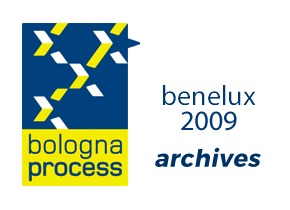Mobility 2007-2009
Coordination Group on Mobility 2007-2009
The London Communiqué asked for actions to be taken at national level to promote the mobility of students and staff by tackling issues relating to immigration, recognition, financial incentives and pension arrangements. It also encouraged an increase in the number of joint programmes and the creation of flexible curricula; it urged higher education institutions to take greater responsibility for a more equitably balanced mobility within the EHEA.
When the European Ministers in charge of higher education met in London in May 2007, they confirmed (2.2, London Communiqué):
Mobility of staff, students and graduates is one of the core elements of the Bologna Process, creating opportunities for personal growth, developing international cooperation between individuals and institutions, enhancing the quality of higher education and research, and giving substance to the European dimension.
At the same time, the Ministers acknowledged the existence of many obstacles to mobility, most notably “issues relating to immigration, recognition, insufficient financial incentives and inflexible pension arrangements”. Therefore, they agreed to work for decisive progress in removing these obstacles and to promote mobility of staff, students and graduates that is more equitably balanced between countries across the European Higher Education Area (EHEA) (2.3, London Communiqué).
To further this work, in the period leading to the Leuven/Louvain-la-Neuve ministerial conference the following Bologna Seminars were held, dealing with various aspects of mobility:
- “Fostering student mobility: next Steps? Involving the stakeholders for an improved mobility inside the EHEA”, Brussels, 29-30 May 2008, organised by the French Community of Belgium.
- “Penalized for Being Mobile? National Pension Schemes as an Obstacle to Mobility for Researchers in the European Higher Education Area”, Berlin, 12-13 June 2008, hosted by the German Rectors’ Conference (HRK) and financed by the German Federal Ministry of Education and Research (BMBF).
- “Let’s Go! – Where To Now?”, Lille, 6-7 October 2008, validation conference organised by Education International and the European Students’ Union.
- “The Europe of Higher Education: Strengthening Pan-European Mobility”, Nancy, 4-5 November 2008, organised by France.
To provide information on the benefits of mobility while promoting the removal of barriers to mobility, Education International and the European Students’ Union jointly organised the mobility campaign “Let’s Go!”, the results of which were presented at the validation conference in Lille.
To coordinate the different activities within the mobility action line into a coherent programme, building upon seminars and other activities of previous periods, the Bologna Follow-up Group (BFUG) decided to set up this coordination group on mobility.
The terms of reference and organization of the CG were validated at the BFUG Meeting in Brdo March 2008 BFUG13_11_6 Bologna Coordination Group on Mobility - update
Terms of reference available pages 8-9 of the Bologna Coordination Group on Mobility Report 2009
The group was also asked to analyse the results of the events and to integrate them into a concise report to BFUG, highlighting the main conclusions and recommendations. For this purpose, the report takes the mobility-related issues identified by the London Communiqué as a starting point and presents the outcomes of the seminars in relation to each of the topics. The full reports and recommendations of the individual seminars are reprinted as annexes to this report.
Bologna Coordination Group on Mobility Report 2009
The report of the Mobility Coordination Group was endorsed by the Bologna Follow-up Group at its meeting on 12-13 February 2009 with the following recommendations:
- increase and diversify the funding available for mobility at all levels (institutional, national, regional and European);
- increase and diversify the forms of mobility;
- integrate opportunities for mobility in the structure of all study programmes;
- provide transparent and fair recognition as well as credit transfer on the basis of learning outcomes and according to the Lisbon Recognition Convention;
- offer better information, guidance, and counselling to students, early stage researchers and staff;
- give students at all levels the opportunity to learn at least two foreign languages;
- make special provisions for higher education staff, early stage researchers and students,
- allowing them (and their families) to get visas and work permits relatively easily;
- recognise, both in terms of career advancement and teaching load, the work done by academics who are responsible for student mobility or who are mobile themselves.
- make (the quality of) mobility an integral part of quality assurance at programme and institutional level;
- develop national action plans for large-scale mobility, with clear benchmarks for inward and outward mobility, and include the national action plans in any future stocktaking exercise.
- explore the possibility of a common European Higher Education Area benchmark for mobility.
Making mobility work requires a comprehensive and strategic approach involving key ministries, higher education institutions, employers, staff and students. Therefore, it is crucial to devise a multilevel strategy to make substantial progress in increasing mobility after the Leuven / Louvain-la-Neuve ministerial conference.
Bologna Seminars
- Bologna Seminar "Fostering student mobility: next steps?", 29-30 May 2008, Brussels
- Bologna Seminar "Penalized for Being Mobile? National Pension Schemes as an Obstacle to Mobility for Researchers in the EHEA", 12-13 June 2008, Berlin
- French Presidency Conference on Mobility "The Europe of Higher Education: Strengthening Pan-European Mobility", 4-5 November 2008, Nancy
Members
Coordination Group Chair: Gayane Harutyunyan (Armenia)
Participants: Armenia, Austria, Belgium/French Community, Croatia, France, Germany, Hungary, Russian Federation, Spain, Education International, European Students’ Union
Bologna Seminar
“Employability – the Employers’ Perspective and its implications” organised by and in Luxembourg, on 6-7 November 2008
RELATED DOCUMENTS
- Bologna Coordination Group on Mobility Report 2009
- BFUG_CZ_15_4_5 Mobility CG report
- Bologna Seminar on Mobility for Researchers Berlin June 2008 - Final report
- BFUG_FR_14_10.1 Bologna Coordination Group on Mobility - update
- BFUG13_11_6 Bologna Coordination Group on Mobility - update
- BFUG13_11_6a Progress report from the joint chair of the Network of Experts on Student Support
- BFUG13_11_6b Council of European Union resolution of 23 November 2007 on modernising universities

